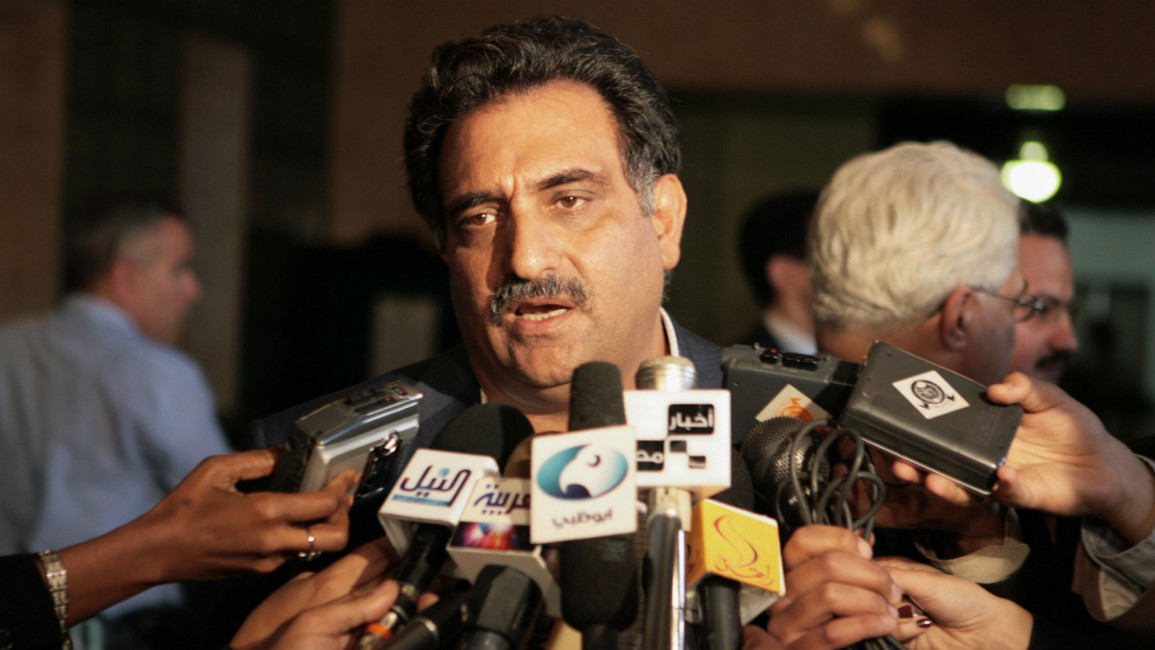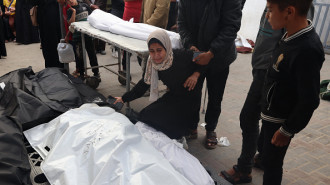Azmi Bishara: Israel plans to remove Gaza population but Egypt can stop it
The displacement of Palestinians from Gaza is a deliberate Israeli plan that Israeli PM Benjamin Netanyahu is officially pitching to Western officials for support, Dr Azmi Bishara, Director of the Arab Center for Research and Policy Studies said in a new interview.
Bishara stressed that the only thing that can stop the displacement project is Egypt declaring that this would be considered an act of war by Israel, which has not happened yet.
In the interview with Alaraby TV, Bishara anticipated that the coming phase would predominantly be ground battles, predicting that the US deadline given to Israel regarding its operations in Gaza would be "weeks, not months".
What is most urgent today is securing a permanent ceasefire rather than humanitarian truces, he added, while regretting that the demonstrations taking place in the West are having far more impact than Arab summits.
He described current arguments within the Israeli leadership as "important, but they don't concern us".
How can displacement be prevented?
While Israel recently divided Gaza using a grid map circulated to Gazan residents in the south, Bishara doesn't believe this is linked to its plans of displacement but is simply part of its "political manoeuvring" to obfuscate its real goals.
However, he warned that displacement could occur when the majority of Gazans were crammed, besieged, and starved in the south, near the border with Egypt, and suddenly a passage out was opened for them. In this case, survival instinct could push people to leave.
He stressed that what would prevent displacement wouldn't be the will of the people as steadfast at they are, but "a clear declaration by Egypt to Israel, stating that displacement would be considered a declaration of war against Egypt".
While Israel had expulsion plans for the Palestinians before the 1948 Nakba – mainly the Dalet Plan - Bishara stressed that "displacement doesn't [just] happen according to plans; it's incumbent on leaders and officials of the countries who will be affected with the expulsion to respond to Israel through taking clear steps to clarify that they [Israel] don't rule the region, they are not master of the region."
Bishara said the failure of the Arabs to adopt this kind of position was partly due to officials fearing damage to their relationships with Washington, but warned that they have currently taken "positions as onlookers," adding, "the protests in Western streets right now are more influential than the Arab summits".
Bishara said he also expected more from the Arab street than what is happening in terms of protests and public mobilization.
Gaza's southern front
Regarding the course of Israel's assault, Bishara explained that Israel's grand plan was still based on destroying Gaza, an expression of primitive tribal revenge-taking against Gazan society to pressurize Hamas, reducing the number of the Gazan population through expulsion and killing, restoring Israel's military prestige, and crushing Hamas militarily, so that they won't be able to govern Gaza in the future.
He noted that in Israel's attempt to implement this plan they were "stumbling, there is a lot of chaos and large resistance". He added that Israelis quickly choose the option of bombing "because they find fighting on the ground difficult".
Bishara urged Palestinians to expect the worst scenarios, because Israel intends to enter Khan Younis and raid Hamas leaders' homes, as if Hamas leaders might be waiting for them there.
He pointed out that the capability and courage of the armed resistance to the occupation had "gained legitimacy on the Arab street, and whoever reduces it to its (Islamist) ideology is mistaken, because whoever resists the occupation in these circumstances gains legitimacy."
He also warned that there were "no military guarantees - everything depends on the resistance's capabilities, steadfastness, pragmatism, expectation of the worst, and planning."
Regarding the extreme brutality Israel had shown upon resuming its war on Gaza after the seven-day truce, Bishara commented that this was sadly expected: "According to the logic of the Israelis, the pressure on the Hamas movement must be increased. This is tactical. However, strategically, they are racing against time amid the American message that time is running out, and that Israel has weeks, not months, to end the bombing and targeting of civilians, according to what US Secretary of State Anthony Blinken informed Israeli leaders last week."
However, Bishara added that Blinken's words didn’t mean people could expect Israel to lessen the intensity of its assault. He asserted that the Americans still agree with Tel Aviv on the goals of the war, but have begun to lose patience with the slaughter being carried out on such a scale.
However, none of what Blinken said translated into US warnings to Israel against targeting civilians, rather it had just "advised" them to try to avoid killing them, to which Israel had answered "we will try".
So there was nothing binding, explained Bishara, who added that even the US National Security Council Spokesman John Kirby usually appears no different to an Israeli government spokesman.
Based on that, Bishara says that in the coming days - in which he expects to see ground battles dominate – this is when American verbal concerns for Palestinian lives will be tested.
Following Anthony Blinken's visit to Israel before the resumption of hostilities in Gaza, did the US give Israel the green light to resume its war? ⬇️https://t.co/0Nv27IVSIZ
— The New Arab (@The_NewArab) December 3, 2023
He also adds that as time passes, the US Administration will be increasingly involved in its domestic affairs as it prepares for next year's elections.
He described President Biden's dilemma: "He's become a prisoner of his support for Netanyahu - if he keeps supporting him he’ll lose votes and if he stops supporting him, he'll lose votes from other groups in American society".
Bishara sees Biden's position on the Middle East and Palestine as identical to ex-President Donald Trump's, though he differs completely on other foreign policy issues.
Bishara made special mention of Brett McGurk, National Security Council coordinator for the Middle East and North Africa, who has served in four US administrations prior to the Biden administration today. Bishara described his views as among the most anti-Arab in within the whole US administration.
Truce or ceasefire
On the potential for a new truce mediated by Qatar, Bishara recalled that Israel "was never interested in a truce, and the Israeli army had wanted to continue fighting".
However, the hostages' families had built up pressure which the military and political leadership wanted to be rid of.
However, at the first chance, Israel had fabricated justifications to resume the killing, and had started negotiating on the truce in terms of hours not days, and at this point, Hamas believed there was nothing to be gained from this sort of truce, according to Bishara.
"Today the most important thing is reaching a formula for a permanent ceasefire […] and the Hamas leadership must put forward ideas for a ceasefire based on negotiations".
Bishara agreed that the pressure wielded by the Israeli hostages' families on the military and Israeli leadership was important, because currently they are the only movement allowed to demonstrate in Israel.
Moreover, they are increasingly convinced their state is lying about the hostages, after it appears they were well treated in Gaza, contrary to assertions by Netanyahu and his clique. Plus, they fear more for their children from Israeli bombing than anything else.
Bishara points out that there are implicit Israeli orders to shoot Palestinian resistance fighters to relieve Israel from the burden of jailing them.
However, Israeli society had been shocked by the killing of an Israeli in occupied Jerusalem, a few days ago, when he was shot by Israeli security guards after he had killed a Palestinian carrying out an attack. They had mistaken him for a Palestinian, even though he had put his hands in the air and called out to them. This incident was also prompting Israelis to question the official version of the events of 7 October.
Bishara described the current arguments between the Israeli leaders as "important, but of no concern to us".
This is because they don't relate to halting the killing, but simply to past and present disagreements regarding war tactics.
On who is leading the war on Gaza, Bishara said usually this would be the politicians, to whom the military is subject. However, the public loss of confidence in Netanyahu's leadership forced the latter to form a war cabinet and bring his opponents into it, and it is actually the generals who are pressing for a continuation of the military escalation today.
The boycott and public opinion
While Bishara expressed his appreciation for the importance of boycott campaigns against Israel, he said they become more effective when countries adopt them, as history reminds us, like with the boycott against the apartheid regime in South Africa.
He advised the Palestinians to build on the notable shift in international public opinion in their favour, and capture the resulting momentum before they lose it.
He repeated his view that calls for Israeli officials to be tried before the International Court of Justice was "basically expressing a stance [in favour of the Palestinians], and this is positive, but experience shows that only the defeated are tried and not the victors, and this is currently unattainable, given the American and European support for Israel that prevent it's defeat."
In conclusion, he warned that "we cannot rely on international courts, but on the resistance, the stance of the public, and reliance on ourselves".


![A case related to Palestinian academic freedom is argued in US federal court. [Brooke Anderson/TNA]](/sites/default/files/styles/image_330x185/public/2024-05/IMG_1405.jpg?h=71976bb4&itok=y0zgklKx)
